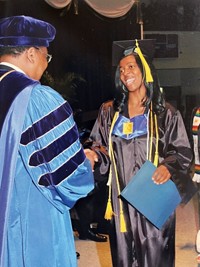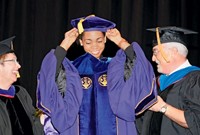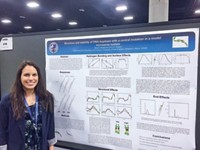Advertisement
Grab your lab coat. Let's get started
Welcome!
Welcome!
Create an account below to get 6 C&EN articles per month, receive newsletters and more - all free.
It seems this is your first time logging in online. Please enter the following information to continue.
As an ACS member you automatically get access to this site. All we need is few more details to create your reading experience.
Not you? Sign in with a different account.
Not you? Sign in with a different account.
ERROR 1
ERROR 1
ERROR 2
ERROR 2
ERROR 2
ERROR 2
ERROR 2
Password and Confirm password must match.
If you have an ACS member number, please enter it here so we can link this account to your membership. (optional)
ERROR 2
ACS values your privacy. By submitting your information, you are gaining access to C&EN and subscribing to our weekly newsletter. We use the information you provide to make your reading experience better, and we will never sell your data to third party members.
Careers
Chavonda J. Mills
Mentoring changed this ACS Scholar's life, now she hopes to pass her experiences on
by Linda Wang
February 22, 2010
| A version of this story appeared in
Volume 88, Issue 8

Participating in the American Chemical Society Scholars Program gave Chavonda J. Mills her first taste of doing research and influenced her decision to become a medicinal chemist. Today, in her role as an assistant professor of chemistry at Georgia College & State University, in Milledgeville, Mills is giving back to the chemistry community by mentoring minority students and encouraging them to stay on-track in the sciences. "I know how beneficial mentorship is and how many opportunities it opens up," she says. "Now that I am a mentor, I'm able to pass that along to the next generation."
Mills, 31, grew up in Decatur, Ga., a suburb of Atlanta. The daughter of a pharmacist, Mills was exposed to science at an early age. "After church on Sundays, I would visit the pharmacy where my father worked," she says. "I remember going behind the counter and asking him questions about what was going on and what he was doing with the medicines."
In high school, Mills excelled in her science courses, and her parents enrolled her in summer science programs at nearby Georgia Institute of Technology and Clark Atlantic University. It was also in high school that Mills realized that African Americans, particularly women, were underrepresented in math and science professions. "I thought it was normal for African Americans to succeed in those areas," Mills says. "Hearing the statistics fueled my desire to go into the sciences even more."
Mills graduated as valedictorian of Columbia High School, in Decatur, and in college she pursued a dual degree in chemistry and chemical engineering through a joint program between Spelman College and Georgia Tech, both in Atlanta. During her junior year, Mills came across a brochure posted in the science building at Spelman for the ACS Scholars Program; she applied and was accepted. Through the program, Mills received a scholarship to conduct research in the lab of Gladys Bayse at Spelman. Mills's project was to examine the stability of the arsenic additive roxarsone in chicken feed using microwave digestion and extraction methods.
Mills would go into the lab every Friday afternoon. "While everyone else was getting ready for the weekend, I was in the lab conducting research," she says. "But I didn't mind; I looked forward to it."
She developed a close relationship with Bayse, with whom she would talk about career options in the sciences. "It was wonderful to be able to see another woman conducting research, especially one who has an active research program," Mills says. She and Bayse have stayed in touch, corresponding at least once a year.
Mentoring is key to the success of the ACS Scholars Program. Since its inception in 1994, the program has matched more than 2,000 African American, Hispanic, and Native American undergraduate students with mentors.
Mills says that another benefit of her participation in the program is that ACS checked in with her regularly to see how she was progressing. "You never want to let anyone down, so it's kind of like they're holding you accountable," she says.
Through the program, Mills attended her first ACS national meeting, which was held in Anaheim, Calif., in 1999. "Being at the conference and not seeing a lot of people who looked like me, it strengthened my resolve to go to graduate school," she says. At the meeting, she networked with graduate students while attending the Committee on Minority Affairs' social events.
During that meeting, ACS celebrated the 100th anniversary of the birth of pioneering African American medicinal chemist Percy L. Julian, and Mills attended the symposium. "That was the first time I heard the phrase medicinal chemist, and everything started to come together for me," she says. "I knew that I wanted to become a medicinal chemist."
After graduating from Spelman and Georgia Tech in 2001, Mills went to Florida A&M University, in Tallahassee, where she received a Ph.D. in medicinal chemistry in 2006. She then chose to go into academia because she wanted the freedom to pursue her own research interests.
At Georgia College, Mills teaches two lecture courses and two corresponding labs. When she's not teaching, she is studying flavonoid derivatives as potential anticancer and anti-HIV agents. She tells C&EN she is one of two minority faculty in the chemistry department. "One of the reasons I chose Georgia College & State University is because it is a majority-serving university, and I wanted the minority students there to see diversity on the faculty," she says.
Mills founded the university's Catalyst Network for Underrepresented Minorities in Science, which aims to increase retention of minority students in the sciences through mentorship. Practicing what she preaches, Mills also mentors minority middle and high school students interested in the sciences. "For me, going into the sciences wasn't abnormal, and I want to make it just as normal for others," she says.
Please contact Kathy Fleming in the ACS Development Office for more information on contributing to this important program. She may be reached at (800) 227-5558 ext. 6210 or by e-mail at k_fleming@acs.org.






Join the conversation
Contact the reporter
Submit a Letter to the Editor for publication
Engage with us on Twitter